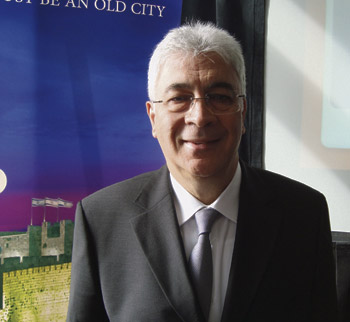In 1981, British immigrant David Lewis built a luxury hotel in Eilat that catapulted the sleepy Red Sea port town into the major leagues of international tourism.
The King Solomon Palace attracted thousands of British and French sun-seekers, and laid the groundwork for construction of even more hotels by Lewis’s Isrotel chain.
Eilat remains the site of seven of Isrotel’s 17 hotels, but the country’s second-largest chain has plans to open more. Nahum Kara, the company’s director of marketing and sales, described the company’s expansion plans last week at a meeting in Toronto. Speaking to members of the travel industry gathered under the auspices of the Israel Government Tourist Office (IGTO), Kara said the company has set June 2 and June 7 as the “soft openings” of the Royal Beach Hotel in Tel Aviv and the Cramim Spa Hotel in the Jerusalem Hills, respectively.
The company has plans to add yet a third new hotel in two or three years. Land has been acquired in the Gan Hapamon neighbourhood in Jerusalem near the old train station and within walking distance of the Old City, Kara told The CJN. The proposed five-star hotel will offer 250 rooms to go along with 30 condominium residences.
The new venues add to a roster of largely upscale units recently added by Isrotel. Perhaps the most unusual of the new inns is the Beresheet, a boutique hotel situated on the rim of the Ramon Crater in Israel’s Negev Desert.
The deluxe facility opened two years ago and has attracted visitors from around the world.
“Missions have put this hotel on their itinerary because it is unique,” Kara said, adding that so far, 30 per cent of the facility’s visitors hail from North America. In addition to offering a spectacular view of a unique geological formation, the hotel provides jeep tours, camel rides, hiking, bicycle trips and other outdoor adventure activities.
Kara said Isrotel plans to expand, testifying to the health of the tourism business in the country. “Tourism is a growth area in Israel,” he said.
Though its latest ventures are in the luxury category, the company continues to operate three- and four-star hotels as well. And it is regionally diverse. In addition to its stronghold in Eilat, it runs several hotels along the Dead Sea. This region of Israel, only about an hour or two drive from Jerusalem, caters to those seeking the therapeutic benefits of the region, including mud baths and healing waters.
“The Dead Sea is considered a spa region and east Europeans and Russians respect the natural spa facilities,” Kara said.
Isrotel has managed to compete with international chains because of the vision first laid out by Lewis more than 30 years ago, Kara said. “There is no future without a past, and the company was established by a Zionist Jew from the UK… He was a dreamer. He was a pioneer in developing tourism to Eilat, and today Eilat is a resort destination for [people from] around the world.
“We want to be the best in all categories. First, it starts with the condition of our buildings. We constantly renew our properties.” In addition, the chain focuses on quality of service, delivered promptly, and on its food and beverage service. Kara said.
The results can be found in the financial statement’s top and bottom lines. In 2012, Isrotel generated 987 million shekels ($275 million) in revenue, and reported a net profit of 73.5 million shekels ($21 million).
Continuing a policy established by Lewis, who died in 2011, the company reinvests all its profits into the venture, Kara said.
The Lewis family retains control over 87 per cent of the company; the remaining shares are traded in the Tel Aviv Stock Exchange.
There is more to the company than business, Kara said. “We are continuing the policy of the founder. He used to be a great Zionist. Today we employ more than 4,000 employees and bring tourism to the country. We are proud of what we are doing.”
* * *
Joining Kara in addressing the travel industry mavens was Dinah Kutner, general manager of El Al Airlines in Canada. Kutner said the carrier has added an Economy Plus category to its flights out of Pearson. Something between business class and economy, the Plus offers more leg room, the use of an iPad, 30 per cent more recline for the chairs and small “amenity kits.” Cost for the Plus section is the normal economy fare, plus $150.
* * *
IGTO director Ami Alon said some 70,000 Canadian passport holders travel each year to Israel, but his goal is boost the number to 80,000. The agency is continuing to work with “decision-makers in the Christian and Jewish communities,” who help promote missions to the Jewish state.
“Our goal,” Alon said, “is to make it a must, not an accessory.”
Israel is investing in new infrastructure that will add “new products” for returning visitors, including more than $1 million on bicycle routes. In addition, Israel is promoting wine tours and the “Gospel trail.”
Though hopeful the 80,000 figure can be reached, Alon said, “I’m aiming for that goal in the future, but I don’t see it happening this year… This year we won’t get there, but it will be close.”
